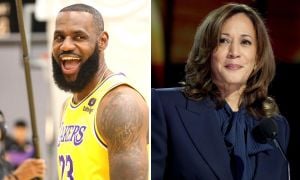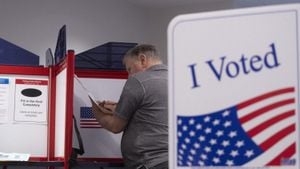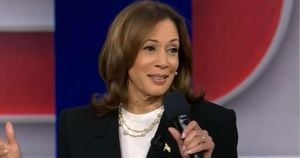Kamala Harris's presidential campaign has stirred up significant debates and emotions, especially around gender politics as the 2024 elections loom near. While pursuing the highest office, Harris has ignited conversations about women's voting rights, their autonomy, and the perceptions of loyalty within relationships—specifically between husbands and wives.
The latest controversy erupted from Harris’s campaign ad supported by actor Julia Roberts, which encourages women to exercise their right to vote according to their beliefs, regardless of their husbands’ preferences. The ad, released by the nonprofit Vote Common Good, features Roberts saying, “You can vote any way you want, and no one will ever know. What happens in the booth, stays in the booth. Vote Harris-Walz.” This message has been interpreted as empowering for women, but it has also drawn sharp criticism from conservative commentators.
Fox News’s Jesse Watters expressed his outrage on air, comparing his wife's potential vote for Harris to infidelity, stating, “If I found out Emma was going [to the voting booth] and pulling the lever for Harris, that's the same thing as having an affair.” Such comments have sparked a broader discussion about how women’s voting rights intersect with traditional views of marriage and loyalty.
Watters was not alone; Charlie Kirk, founder of Turning Point USA, described the ad's encouragement for women to hide their votes from their husbands as “sick” and the “embodiment of the downfall of the American family.” This notion emphasizes the anxiety within certain factions of the Republican Party about women exercising their political rights independently of their husbands.
Recent grassroots campaigns have emerged, encouraging women to vote secretly for their preferred candidates. These campaigns utilize strategies such as leaving Post-it notes urging women to cherish their voting privacy and to trust their instincts during elections. The phrase “Woman to woman, your vote is private,” has been spread on these notes, promoting the idea of private voting among women.
Conservative leaders view these movements with alarm. The criticism also extends to the concept of women voting according to their individual conscience, underscoring the notion among some men within certain communities who feel entitled to dictate or significantly influence their wives' political decisions.
Aside from the ad and its contentious reception, Kamala Harris has been forthright about her positions concerning reproductive rights, which remain central to her campaign. She warns voters of the perilous realities faced if Donald Trump secures another term, especially focusing on the potential loss of abortion rights—a major concern for many female voters. The historical overturning of Roe v. Wade has heightened the urgency of these discussions.
Polls are indicating significant gender disparities as the election nears. Kamala Harris currently leads among early voters, with many analysts noting her substantial support among women, especially younger demographics. Early voting trends suggest women—who are more likely to prioritize issues like reproductive rights and healthcare—are turning out for Harris at above-average rates, raising concerns for Trump as he attempts to maintain his previous support among female voters.
Experts believe white women, who have consistently voted Republican, will be key players in determining the outcome of this election. The attempts to mobilize them against Trump echo previous discussions about their voting patterns and the split between married and single women, with past elections shows white women swinging significantly back and forth between Democratic and Republican candidates.
Efforts are being made within Democratic circles to re-engage these female voters, especially considering Harris's representation as the first female Vice President and now as a leading female candidate herself. Discussions around the effectiveness and influence of outreach groups like “White Women Answer the Call” are central to these mobilization efforts. Members have emphasized the importance of creating dialogues to talk about political concerns and reproductive rights directly with hesitant voters.
Strategists are acutely aware of the significant overlap between personal relationships and voting behaviors. The perception of women's agency is integral to the messaging surrounding this campaign. Whether through informal discussions or organized events, outreach initiatives are linking personal values to voting choices, both for individuals and communities. For Harris, winning back the trust and vote of women—especially white women—is not just about parties but about personal decisions rooted deeply within their experiences and societal issues.
Many supporters of Harris argue for the need to leave outdated perceptions behind. They call for women to vote based on what they deem best for themselves, their families, and their communities. This sentiment gained traction during events aimed at instilling confidence among first-time voters and re-engaging those who may feel sidelined or intimidated by political discourse.
It’s not merely the presidential candidates themselves who are stirring up the conversations around gender politics; but the entire framing of the elections as it relates to duties, expectations, and freedoms of women. The campaign for Harris has opened up broader discussions about societal norms and the need for modern relationships to include individual voices—the idea of unity through diversity, where every woman votes for her future regardless of marital status or partnership dynamics.
The dynamics surrounding the debates over the Harris campaign serve not only as a reflection of political strategy but as markers for how societal values can shift. For many, it’s also about what this means for the future of women’s rights and representation within the political arena. The outcome of the election remains uncertain, yet one thing is clear: Kamala Harris and her team aim to empower women to make choices reflective of their beliefs and values, irrespective of external pressures.



